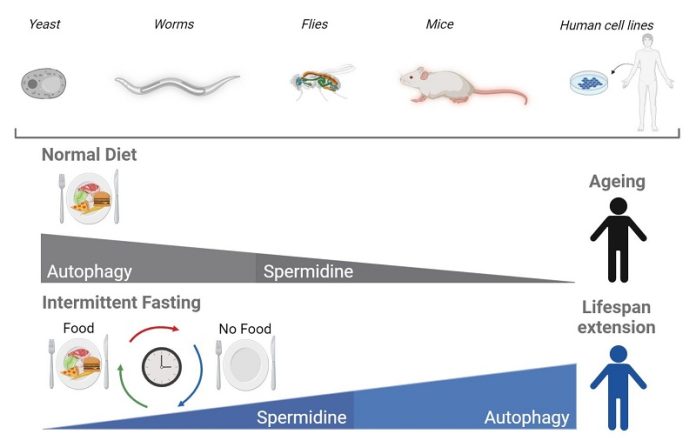
New research has uncovered how intermittent fasting, a popular eating pattern, can help regulate aging by triggering a natural process in our cells called autophagy.
This study, conducted by scientists from the Institute of Molecular Biology and Biotechnology (IMBB) in Greece, Paris Cité University in France, and the University of Graz in Austria, was recently published in the journal Nature Cell Biology.
The findings reveal that a compound called spermidine plays a crucial role in this process, helping to promote the anti-aging effects of intermittent fasting.
Autophagy is like a cellular recycling program. It helps clear out damaged or unnecessary components within our cells, ensuring that they continue to function properly.
When autophagy works well, it can protect against aging and the development of age-related diseases such as diabetes, heart disease, cancer, and neurodegenerative conditions like Alzheimer’s.
However, as we age, autophagy tends to become less effective, leading to a buildup of cellular waste and an increased risk of these diseases. Researchers have been exploring ways to boost autophagy to slow down aging and improve health in later life.
One of the ways to enhance autophagy is through dietary habits. Intermittent fasting, where you cycle between periods of eating and not eating, has been shown to increase levels of spermidine, a natural compound found in our bodies. Spermidine helps cells survive and stay resilient by activating autophagy.
In this study, led by Dr. Nektarios Tavernarakis and his colleagues, researchers used various experimental models, including worms, yeast, fruit flies, mice, and human cells, to investigate the effects of intermittent fasting. They found that fasting increased spermidine levels, which in turn triggered autophagy and led to longer lifespans in these organisms.
Interestingly, when researchers blocked the production of spermidine, the benefits of intermittent fasting on lifespan disappeared. This shows just how important spermidine is in regulating autophagy and promoting longevity.
The study’s findings suggest that spermidine and intermittent fasting could be key to slowing down the aging process and reducing the risk of age-related diseases. Since the process is conserved across different species, it’s likely that similar effects could occur in humans.
This research offers new hope for strategies to improve life expectancy and quality of life, especially for the elderly. By understanding how dietary habits like intermittent fasting can influence aging, we may be able to develop new ways to protect against chronic diseases and promote healthier, longer lives.
In summary, this study highlights the potential of spermidine and intermittent fasting as powerful tools in the fight against aging, opening the door to new approaches for enhancing human health and longevity.
If you care about wellness, please read studies about how ultra-processed foods and red meat influence your longevity, and why seafood may boost healthy aging.
For more health information, please see recent studies about the power of pickle juice ,and time-restricted eating: a simple way to fight aging and cancer.


